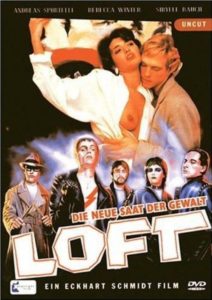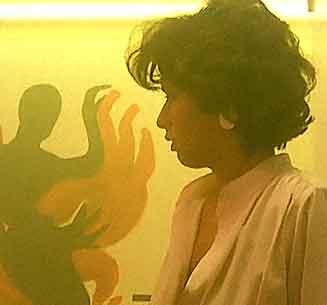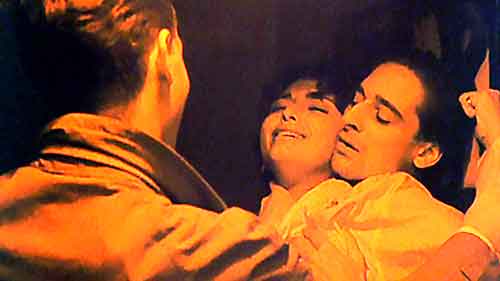 Germany’s Eckhart Schmidt was the director of this sci fi-tinged gore fest from 1985. Like Schmidt’s earlier film DER FAN/TRANCE, LOFT is steeped in 1980s new wave culture, which can be taken as a good or bad thing depending on one’s point of view.
Germany’s Eckhart Schmidt was the director of this sci fi-tinged gore fest from 1985. Like Schmidt’s earlier film DER FAN/TRANCE, LOFT is steeped in 1980s new wave culture, which can be taken as a good or bad thing depending on one’s point of view.
Much of the world depicted in LOFT has been destroyed in a nuclear war, with most of the survivors consisting of oversexed twentysomethings. The film takes place over the course of a single night in a studio apartment, where an art show is being held. There a wealthy couple are getting it on in a secluded room, after which the woman, Raphaela (Rebecca Winter), enters the nearest bathroom. There she’s confronted by a knife-wielding bitch named Kiddy (Catarina Raacke) whose anarchist tendencies and jealous nature have driven her insane.
As for Raphaela’s worse half Raoul (Andreas Sportelli), he’s rather severely manhandled by Furio (Karl Heinz von Liebezeit), the artist whose paintings adorn the loft—and the boyfriend of Kiddy. Furio has gone mad(der), it seems, because none of his paintings have sold.
Raphaela is freed from the bathroom and replaced by Raoul. Furio, it seems, is intent on raping and killing Raphaela, and he and his equally depraved friends torment her in various horrific ways. Eventually Raphaela succeeds in turning the tables on her attackers by getting ahold of Kiddy’s knife, while Ralph creates a makeshift weapon from a shard of glass after breaking the bathroom mirror. What follows is a gory free-for-all that few survive, and from which even fewer emerge unbloodied…
Such is LOFT, whose science fiction angle seems pointless. The film, like much of Schmidt’s better work (including DER FAN, DAS GOLD DER LIEBE and DER SANDMANN), is very much a horror-tinged product that, in its blunt depiction of class relations and social engineering, was clearly intended as a portrait of Germany at the time of its making. Unlike Schmidt’s better work, however, the sex and violence of LOFT feel gratuitous and exploitive. That’s despite the oft-pretentious, theatrically inclined dialogue, which seems to have been intended to give the proceedings a more refined veneer.
The version I viewed had horrifically awful—although, given the campy and archaic nature of the proceedings, quite appropriate—English dubbing. That campiness is evident in the quintessentially eighties-centric look, with its multi-hued neon illumination, smoke-filled interiors and dramatic backlighting, which is matched by a highly discordant electronic score that back in 1985 might have passed for avant-garde. It’s fun for eighties nostalgists with a taste for the extreme (which explains why I enjoyed LOFT despite its shortcomings), but is likely to leave everyone else feeling unfulfilled.
Vital Statistics
LOFT
Barbara Moorse Workshop/KF Kinofilm
Director: Eckhart Schmidt
Producer: Wolfgang Odenthal
Screenplay: Eckhart Schmidt
Cinematography: Bernd Neubauer
Editing: “Raoul Sternberg” (Eckhart Schmidt)
Cast: Andreas Sportelli, Rebecca Winter, Ralph Schicha, Karl Heinz von Liebezeit, Catarina Raacke, Tidof, Paul Baur, Sybille Rauch


